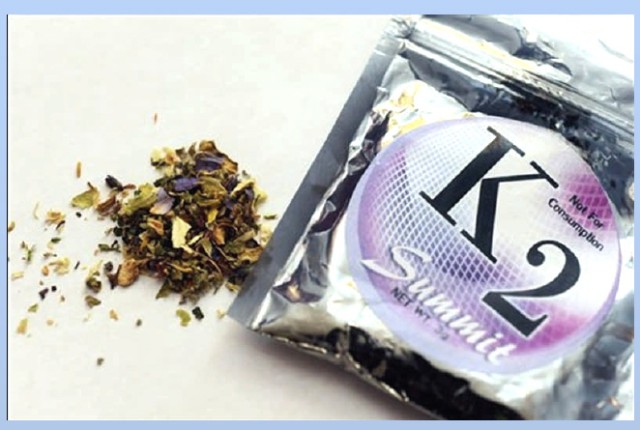
There is a legal drug which is being sold in the U.S. as herbal incense.
This drug, known as spice or K2, is said to give the user a marijuana-like high. It is being sold under various brand names online, in head shops and even at some gasoline stations.
The drug is marketed as incense but the products are usually smoked by its users. Spice is a synthetic cannabis, which is a herbal and chemical product that mimics the effects of cannabis.
When synthetic cannabis was first sold, it was thought that the effects were achieved through a mixture of legal herbs.
In 2008, an analysis proved this was not true and that they contained synthetic cannabinoids, which act on the body in a similar way to cannabinoids naturally contained in cannabis such as tetrahydrocannabinol (THC), the psychoactive chemical in marijuana.
Instead, Spice contains synthetic chemicals - known as JWH-018, JWH-073, or HU-210 - that mimic THC by acting on the cannabinoid receptors in the brain.
Although synthetic cannabis does not produce positive results in drug tests for cannabis, it is possible to detect its metabolites in human urine.
The synthetic cannabinoids contained in synthetic cannabis products have been made illegal in many European countries including the United Kingdom, Germany, France, Poland, Sweden, Switzerland, Austria, Chile, Russia and South Korea, but remain legal under federal law in the U.S. and Canada.
The drug became popular in the U.S. in 2008 and there are several U.S. states - including Georgia - that have passed laws making it illegal.
Spice's key ingredients were invented by Dr. John Huffman at Clemson University in 1995, while doing medical research on the effects of cannabinoids on the brain.
He found no medical benefits and only negative side effects.
It moved on to become a plant growing aid in Asia and is now manufactured and marketed online as herbal incense.
It is sold in three to five gram bags, creating a legal alternative to marijuana. Some U.S. military commands have banned Spice, as the potential for its abuse has been recognized.
In the Army, the use of noncontrolled intoxicants - to include natural substances - is prohibited under Army Regulation 600-85 (Army Substance Abuse Program).
The Army has taken a proactive stance on addressing the dangers of Spice. A violation can lead to disciplinary action, which may range from a reprimand to a dishonorable discharge.
A Spice user may have no idea what he or she is being exposed to, due to the high quantity of other synthetic materials contained in the drug.
It is known to be between 100 to 800 times more powerful than marijuana.
Even worse are the severe side effects, including anxiety attacks, nausea, hallucinations, paranoia, psychotic episodes, chemical dependency and rapid heart rate. Victims have been known to suffer a severe reaction to the drug, resulting in swelling of the brain.
The growing popularity of the drug is causing increasing alarm among law enforcement officials, military personnel, lawmakers and health care professionals across the U.S. Spice serves no apparent useful purpose and can result in addicted Family members, drug-impaired drivers and drug-related deaths. Anytime a person consumes an uncontrolled or unregulated drug, he or she is taking a risk.
Products like Spice are not made in a controlled environment and have the potential to be fatal.

Social Sharing